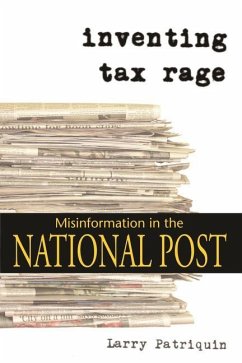This careful documentation illustrates how the "National Post" influenced Canadian government policy by fabricating a consensual public "tax rage" forcing liberal legislators to side with their conservative counterparts, and demonstrating through the error of liberal law makers the key elements for building and critiqing an argument.
During the National Post's first year of publication, it claimed that Canada's supposedly exorbitant taxes were causing great damage to the economy and had produced a form of "tax rage" among the middle class. In contrast, Larry Patriquin suggests that the paper's writers were engaged in a dubious form of "reasoning" in order to promote an ideology that mostly benefits the wealthy. This involved presenting the Post's aspiration for tax cuts as the "agenda of the people" when, as this book demonstrates, the vast majority of citizens receive little or no benefit from low levels of taxation. In advancing its case, the Post published a stunning collection of factual and logical errors that were incessantly repeated in editorials and columns. Yet in 2000, the federal Liberal Party surrendered completely to the bogus "tax rage" invented by the Post and, as a result, the Liberal's fiscal policy became inseparable from right-wing platforms. Patriquin categorizes these errors to better illustrate why the arguments are flawed. He structures the chapters in a point-counterpoint format to serve as a guide for readers on how to, and how not to, develop and defend an argument.
During the National Post's first year of publication, it claimed that Canada's supposedly exorbitant taxes were causing great damage to the economy and had produced a form of "tax rage" among the middle class. In contrast, Larry Patriquin suggests that the paper's writers were engaged in a dubious form of "reasoning" in order to promote an ideology that mostly benefits the wealthy. This involved presenting the Post's aspiration for tax cuts as the "agenda of the people" when, as this book demonstrates, the vast majority of citizens receive little or no benefit from low levels of taxation. In advancing its case, the Post published a stunning collection of factual and logical errors that were incessantly repeated in editorials and columns. Yet in 2000, the federal Liberal Party surrendered completely to the bogus "tax rage" invented by the Post and, as a result, the Liberal's fiscal policy became inseparable from right-wing platforms. Patriquin categorizes these errors to better illustrate why the arguments are flawed. He structures the chapters in a point-counterpoint format to serve as a guide for readers on how to, and how not to, develop and defend an argument.








